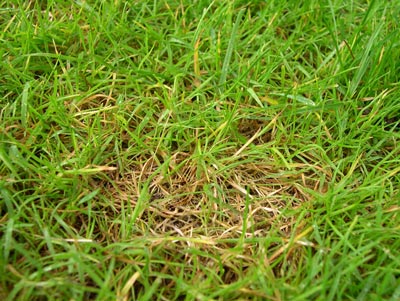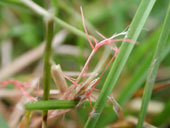Lawn diseases are among the most difficult to diagnose. Many are opportunistic, which means the conditions have to be just right for them to occur. Those conditions may include too much rain, poor drainage, cool wet temperatures or heat stress.
 Dollar spot
Dollar spot
© Cornell University
Dollar spot is probably one of the easiest to recognize because it looks like its name — clusters of brown or straw-colored spots in the lawn. When it appears, it may indicate poor overall turf health and management. Bluegrass and fescues may be affected, especially when closely mowed. Dollar spot – caused by a fungal pathogens Lanzia or Moellerodiscus – is most visible when there is dew on the grass. Look for white cobwebs in the lawn. The fungus may have red edges.
 Red thread
Red thread
© Ohio State University
Red thread (Laetisaria fuciformis) actually gives the lawn a reddish tint, which can be picked up on shoes, garden tools and equipment. This fungus disease produces twisted, red threadlike strands on the grass leaf blade. It is most likely to occur in early summer or when there have been frequent periods of short rainfalls (or irrigation), rainy overcast days and cool weather. It can be spread by foot traffic and by dragging the hose through an infected area.
What to do
One of the best ways to guard against these diseases is to keep the lawn in good condition. Mow at the maximum height — 3–3½ inches, don’t overwater or overfertilize.
Although these diseases may cause thinning and discoloration of the lawn, they usually self-correct or grow out of the problem when conditions improve. If you need help identifying the disease, contact your local county extension agent for a correct diagnosis.
However, if the infestation is severe and it becomes necessary to control the disease, Eagle® is a fungicide that has been approved for these problems. Using a lawn spreader, the fungicide is applied to a dry lawn and watered in. Always read and follow the label directions. For more information about Eagle and to order online, please click here.